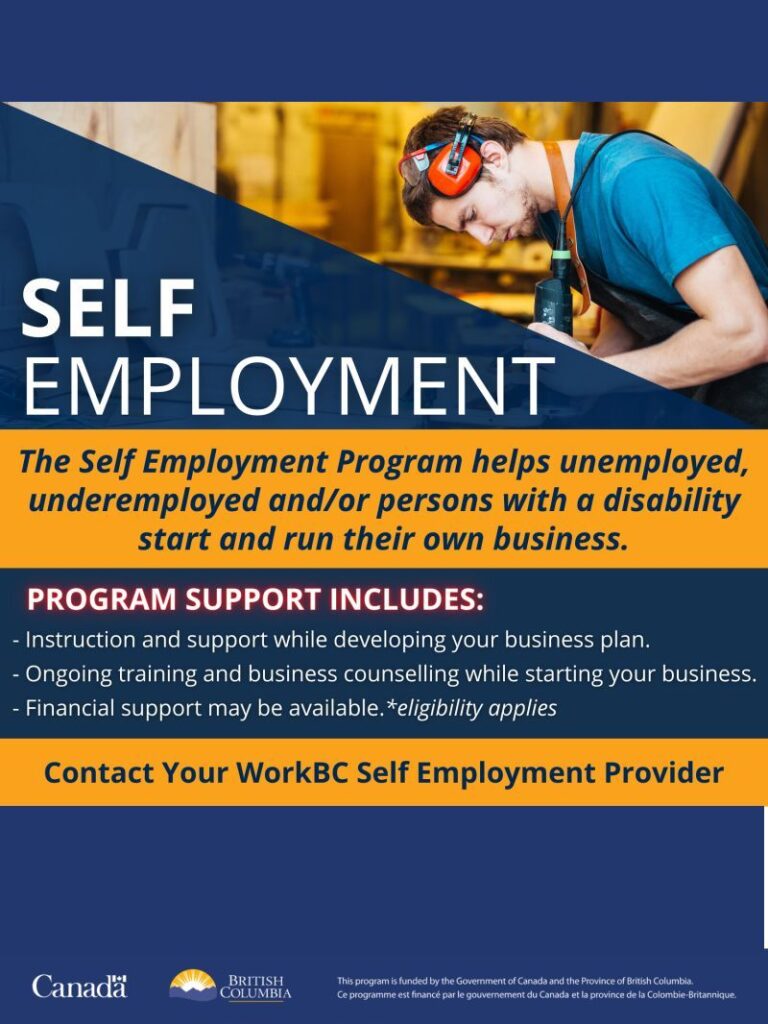Self-employment support in Canada is aimed at assisting individuals who choose to work for themselves and establish their own businesses. The Canadian government offers various programs and resources to support self-employed individuals, including financial assistance, training and development opportunities, and networking platforms. Here are some of the key aspects of self-employment support in Canada:
Financial Assistance:
- Canada Emergency Response Benefit (CERB):
Although this program was introduced in response to the COVID-19 pandemic and has expired, it provided temporary financial support to self-employed individuals who experienced a significant decrease in income.
- Employment Insurance (EI):
Self-employed individuals can access EI benefits through the Special Benefits program, which includes maternity, parental, sickness, and compassionate care benefits. However, eligibility criteria and application processes may vary, so it’s important to consult the official government resources for up-to-date information.
- Canada Recovery Benefit (CRB):
This program was introduced as a replacement for CERB and provides financial support to individuals who are not eligible for EI. Self-employed individuals who experienced a decrease in income due to the pandemic can apply for CRB.
Tax Benefits and Deductions:
- Business Expenses: Self-employed individuals can claim various business-related expenses as deductions on their tax returns. These expenses may include office supplies, equipment, advertising, professional fees, and other costs associated with running a business.
- Home Office Expenses: If a portion of your home is used exclusively for your business, you may be eligible to deduct a portion of your home expenses, such as rent or mortgage interest, property taxes, utilities, and maintenance costs.
- Canada Pension Plan (CPP): As a self-employed person, you are responsible for both the employer and employee portions of CPP contributions. These contributions allow you to qualify for CPP benefits in the future.
Business Development and Training:
- Business Development Bank of Canada (BDC): BDC offers financing, consulting, and advisory services to help self-employed individuals start and grow their businesses. They provide resources and guidance on business planning, marketing, operations, and financial management.
- Canada Business Network: This government initiative offers a wealth of resources, information, and tools for self-employed individuals. They provide guidance on starting a business, including market research, business planning, financing options, and regulatory requirements.
- Entrepreneurship Training Programs: Many provinces and territories offer entrepreneurship training programs to support self-employed individuals. These programs provide workshops, courses, and mentoring opportunities to help develop essential business skills.
Networking and Support:
- Chambers of Commerce and Business Associations: Local chambers of commerce and business associations provide networking opportunities, mentorship programs, and business resources for self-employed individuals. They often organize events and workshops to facilitate networking and knowledge sharing among entrepreneurs.
- Online Platforms: Various online platforms, such as LinkedIn, industry-specific forums, and social media groups, offer opportunities for self-employed individuals to connect with like-minded professionals, seek advice, and collaborate on projects.
Self-Employment Assistance Program (SEAP):
SEAP is a program offered in some provinces, such as British Columbia, Newfoundland and Labrador, and Prince Edward Island. It provides financial support and training to eligible individuals who are unemployed and want to start their own businesses. Participants receive financial assistance, business training, and mentoring to help them establish and run their businesses successfully.
Canada Small Business Financing Program (CSBFP):
This program aims to help small businesses, including self-employed individuals, obtain financing by providing access to loans with favorable terms. The CSBFP is a partnership between the Government of Canada and financial institutions, and it guarantees a portion of the loan, making it easier for self-employed individuals to secure funding.
Business Incubators and Accelerators:
Business incubators and accelerators are organizations that provide support and resources to early-stage startups and self-employed individuals. These programs often offer office space, mentoring, access to networks, funding opportunities, and business development services. Examples of prominent incubators and accelerators in Canada include MaRS Discovery District in Toronto and TEC Edmonton in Alberta.
Skills Development and Training Grants:
The Canadian government offers various grants and funding programs to support skills development and training for self-employed individuals. For example, the Canada Job Grant provides financial assistance to employers and self-employed individuals to help cover the costs of training programs that enhance skills and promote workforce development.
Indigenous Entrepreneurship Programs:
The Government of Canada provides specialized support programs for Indigenous entrepreneurs who are self-employed or looking to start their own businesses. These programs offer funding, training, mentorship, and other resources tailored to the unique needs and aspirations of Indigenous entrepreneurs.
Provincial and Territorial Support:
In addition to federal programs, each province and territory in Canada may offer its own self-employment support initiatives. These can include grants, loans, tax incentives, and training programs specific to the region. It’s important to research the resources and programs available in your specific province or territory to take advantage of local support.
Industry-Specific Support:
Some industries or sectors in Canada have specialized support programs for self-employed individuals. For example, the Cultural Human Resources Council (CHRC) offers resources, training, and support to self-employed individuals working in the cultural sector, such as artists, musicians, and writers.
Remember to visit official government websites, regional business development agencies, and local chambers of commerce for the most accurate and up-to-date information on self-employment support programs in your area. These resources can provide detailed information on eligibility criteria, application processes, and the specific support available for self-employed individuals in Canada.

